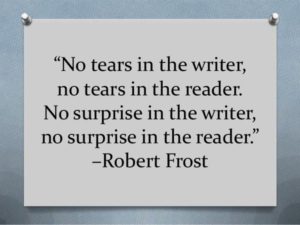Regan Platt is an offline marketing intern at Author Solutions, the world leader in supported self-publishing. She is currently a senior at Indiana University where she studies English. Regan is in Indiana University’s Liberal Arts Management Program, an honors level interdisciplinary program that incorporates Kelley School of Business courses with a liberal arts education.
Don’t stop reading.
William Faulkner: “Read, read, read. Read everything — trash, classics, good and bad, and see how they do it. Just like a carpenter who works as an apprentice and studies the master. Read! You’ll absorb it. Then write. If it’s good, you’ll find out. If it’s not, throw it out of the window.”
Meaning: Faulkner emphasizes the importance of immersion. If you constantly surround yourself with writing, then you can start to observe both valuable techniques and common pitfalls. As you put to practice what you’ve observed, your own writing will become all the better for it.
Write the book you can’t find.
Toni Morrison: “If there’s a book that you want to read, but it hasn’t been written yet, then you must write it.”
Meaning: This quote can be read as a call to arms for dreamers and “creatives.” The world would have so much less to read and dream if those with great stories never shared them.
Follow your instincts.
Saul Bellow: “You never have to change anything you got up in the middle of the night to write.”
Meaning: Bellow comforts and encourages fellow writers who work in bursts of passion. Inspiration may come at the strangest and least convenient of times, yet when the muse calls it is best to answer.
Beware the predictable.
Robert Frost: “No tears in the writer, no tears in the reader. No surprise in the writer, no surprise in the reader.”
Meaning: Frost suggests that strong writing occasionally necessitates a stream-of-consciousness technique that leaves only feelings and ideas. This emotional work results in literary moments of ingenuity.
Show, don’t tell.
Anton Chekhov: “Don’t tell me the moon is shining; show me the glint of light on broken glass.”
Meaning: Our final quote by Chekhov reverberates the traditional writing advice “show, don’t tell.” Engaging writing leaves a reader to do some of the “visualizing” work themselves. Rather than dully listing the circumstances, great writing will reveal what’s happening in an innovative way.
– WBP –
WestBow Press authors who’d like to share a 350-600 word experience related to the self-publishing of their books are invited to do so by sending a message through the WestBow Press Facebook page and follow the WestBow Press Twitter account @WestBowPress. WestBow Press reserves the right to edit stories for content, grammar, punctuation, and length.

Excellent reminders! I need to start keeping a notebook and pen by my bed again for those moments of awesome inspirational thoughts
Great quotes! Writing projects are often challenging. Inspirational quotes from successful authors can sometimes be just what you need to get over a hurdle.
Thanks for the Tip, i might just start keeping notes the old school way and saving those inspirational moments